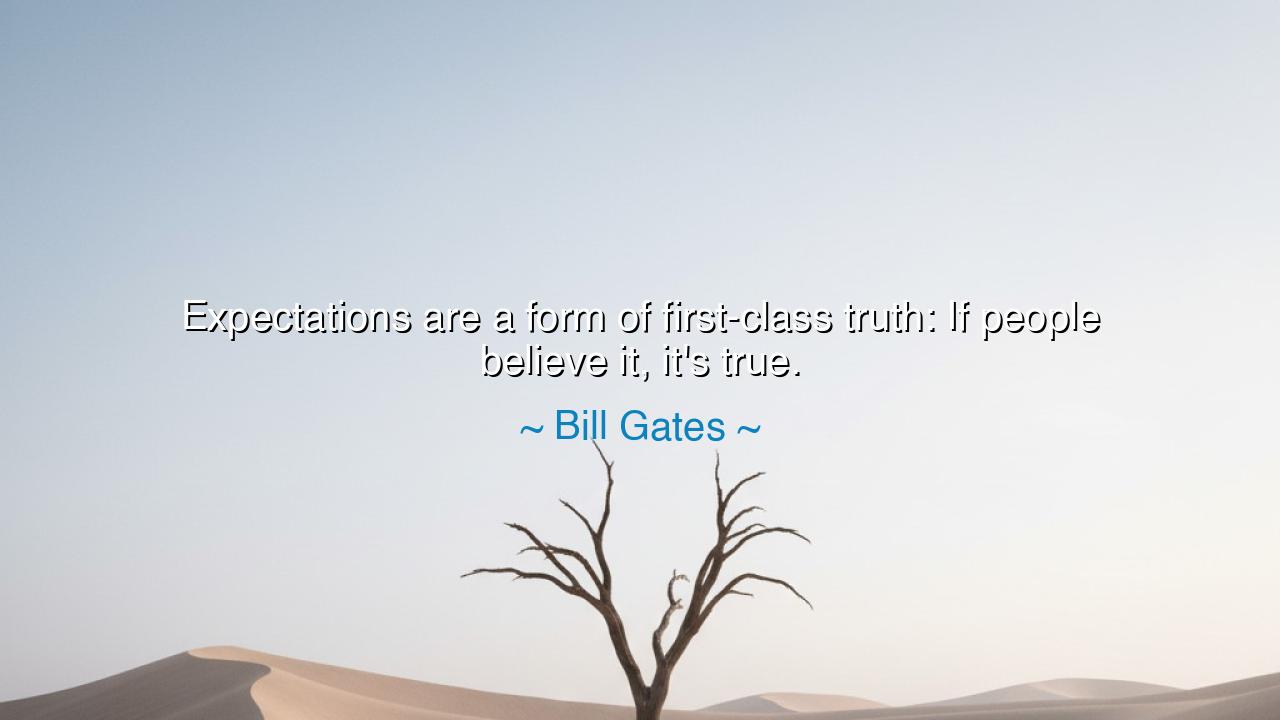
Expectations are a form of first-class truth: If people believe






The words of Bill Gates—“Expectations are a form of first-class truth: If people believe it, it’s true.”—carry the weight of a paradox that has shaped empires, toppled kings, and stirred the destiny of nations. What is an expectation but a vision of what might be? Yet when such a vision is embraced by the hearts of many, it ceases to be mere dream and becomes a living truth that bends the course of reality itself. For men and women act not only upon what is, but upon what they believe will be. Thus, perception becomes power, and belief becomes destiny.
The ancients taught us that faith moves mountains, and Gates, in his modern tongue, reminds us of the same. Consider the marketplace: a rumor of prosperity can send nations into a golden rush, while whispers of failure can plunge economies into despair. Neither condition may yet exist, but the expectation alone creates action, and action gives birth to outcome. The truth is not in the stone, but in the minds of those who see the stone as cornerstone or stumbling block.
Look to the story of Christopher Columbus. Before him, many feared the sea beyond the horizon, for they expected dragons, endless abysses, and the edge of the world. This belief was a truth that restrained them, as binding as chains of iron. Yet Columbus, daring to forge a new expectation—that there was land across the ocean—set sail and reshaped the map of the world. His belief, once a solitary vision, became the belief of kingdoms, and that belief remade history. Thus we see that expectations are not idle thoughts; they are the seeds of empires and revolutions.
But beware: expectations can bless, and they can curse. When people expect corruption, they cease to trust, and trust crumbles. When they expect failure, they cease to try, and failure is assured. In Rome’s final days, the citizens no longer expected greatness of their leaders, nor of themselves. Their disbelief hollowed the empire before the barbarians breached its gates. Here lies the peril: the truth of expectation is merciless, whether it is born of hope or of despair.
And yet, expectation can be the wind that fills the sails of greatness. In the dark days of World War II, Winston Churchill’s voice became the embodiment of expectation. He told his people not only what was, but what would be: “We shall never surrender.” And because they believed him, it became true. A nation bled, but it did not break, and from expectation arose endurance, and from endurance, victory. Thus, when expectation is guided by courage and vision, it becomes the forge of destiny.
The lesson for us, children of tomorrow, is this: guard the expectations you hold and those you plant in the hearts of others. Ask yourself daily—do my beliefs give birth to despair, or do they call forth strength and possibility? If you expect to fail, you will prepare for failure; if you expect to endure, you will find endurance. Expectation is the soil, action the seed, and destiny the harvest.
Therefore, take these actions: nurture expectations of growth, of justice, of kindness, and of resilience. Speak words that lift rather than destroy. When you lead, instill in others the belief that they can rise higher than they imagine. And when you follow, hold fast to the expectations that empower rather than enslave. For in this, Gates has shown us a truth as old as time: expectations are not shadows, but substance. They are the first-class truths that shape the world we inherit and the world we leave behind.






QNDang Quynh Nhu
This quote makes me wonder whether shadows are a metaphor for the things we can never truly leave behind. No matter how much we change, our past deeds, ideas, and even our desires seem to follow us. Are these shadows something we need to accept as part of life, or do they limit our freedom in some way? How much do they really shape who we are?
AAnh
I find it fascinating that Wiesel uses shadows to represent things like desires and memories. Shadows are usually seen as negative or ominous, yet here they are tied to things we might cherish or seek. Does this imply that the 'shadow' of something might not always be bad, but merely an inseparable part of existence? Could these shadows actually help define our humanity?
VDpham van diep
What does it say about us that we can't escape the shadows of our words or actions? If these shadows are with us all the time, how much of them shape the way others see us? Are we ever truly free from them, or do they follow us, subtly influencing everything we do? It’s like an invisible layer to our existence, always there, even when we don’t realize it.
LLLUYEN LE
The idea that words, memories, and desires have shadows really resonates with me. It feels like everything we create or experience leaves an imprint. But can these shadows sometimes be overwhelming, following us in ways we can't control? How do we live with these shadows, especially if they are tied to things we regret or wish we could forget?
NTNhi Tran
I love the depth of this quote. It highlights the idea that our actions, ideas, and even our past are always with us, like shadows. Could it be that we sometimes try to escape these 'shadows' but they are an inseparable part of who we are? How much do our past experiences, deeds, and even desires influence the person we become?